Serving 470 students in grades Prekindergarten-5, Crystal Hill Elementary School ranks in the bottom 50% of all schools in Arkansas for overall test scores (math proficiency is bottom 50%, and reading proficiency is bottom 50%).
The percentage of students achieving proficiency in math is 25% (which is lower than the Arkansas state average of 38%). The percentage of students achieving proficiency in reading/language arts is 27% (which is lower than the Arkansas state average of 40%).
The student:teacher ratio of 14:1 is higher than the Arkansas state level of 13:1.
Minority enrollment is 86% of the student body (majority Black), which is higher than the Arkansas state average of 42% (majority Black).
Quick Stats (2025)
- Grades: Prekindergarten-5
- Enrollment: 470 students
- Student:Teacher Ratio: 14:1
- Minority Enrollment: 86%
- Overall Testing Rank: Bottom 50% in AR
- Math Proficiency: 25% (Btm 50%)
- Reading Proficiency: 27% (Btm 50%)
- Science Proficiency: 23% (Btm 50%)
- Source: National Center for Education Statistics (NCES), AR Dept. of Education
School Overview
Crystal Hill Elementary School's student population of 470 students has declined by 23% over five school years.
The teacher population of 34 teachers has declined by 19% over five school years.
Grades Offered
Grades Prekindergarten-5
Total Students
470 students
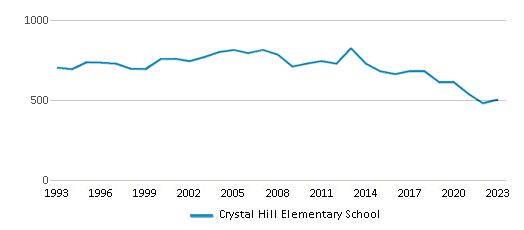
Gender %
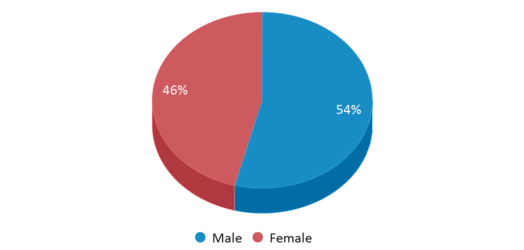
Total Classroom Teachers
34 teachers
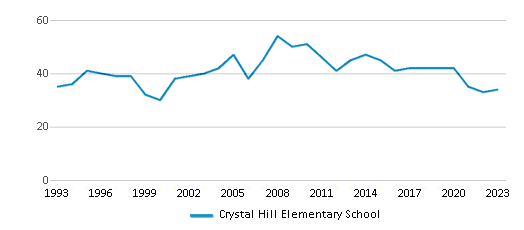
Students by Grade
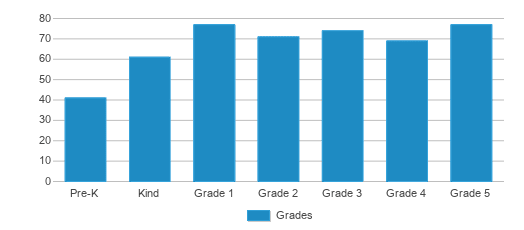
School Calendar
School Rankings
Crystal Hill Elementary School ranks within the bottom 50% of all 997 schools in Arkansas (based off of combined math and reading proficiency testing data).
The diversity score of Crystal Hill Elementary School is 0.50, which is less than the diversity score at state average of 0.61. The school's diversity has stayed relatively flat over five school years.
Overall Testing Rank
#765 out of 997 schools
(Bottom 50%)
(Bottom 50%)
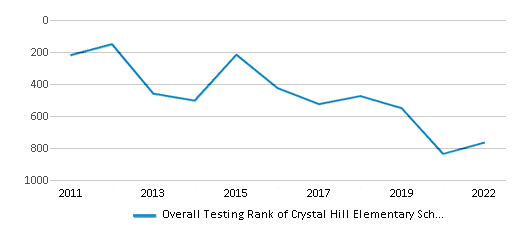
Math Test Scores (% Proficient)
25%
38%
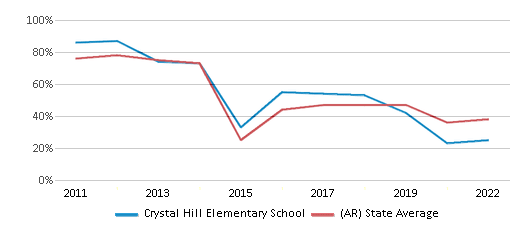
Reading/Language Arts Test Scores (% Proficient)
27%
40%
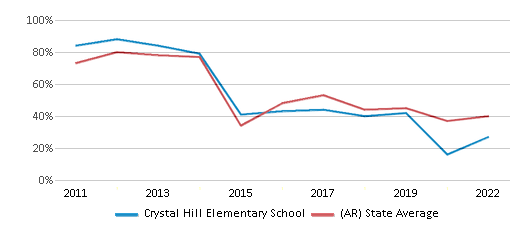
Science Test Scores (% Proficient)
23%
36%
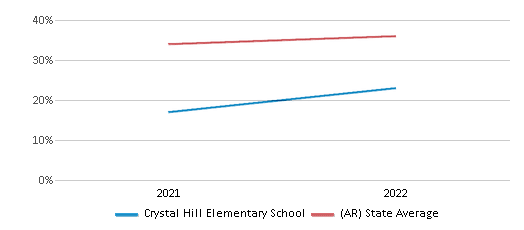
Student : Teacher Ratio
14:1
13:1
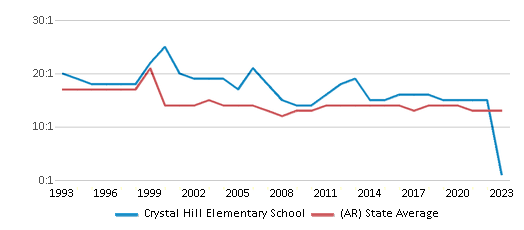
American Indian
n/a
n/a
Asian
2%
2%
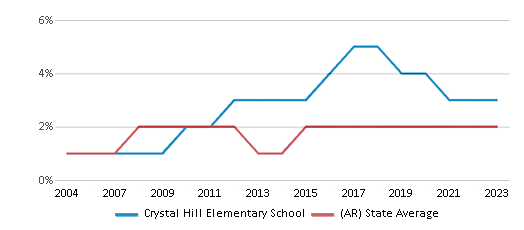
Hispanic
7%
15%
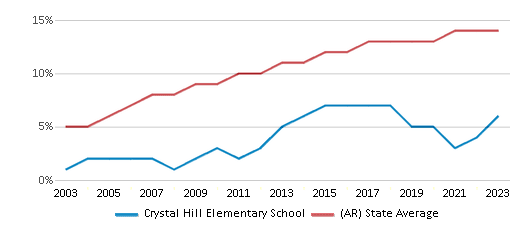
Black
69%
19%
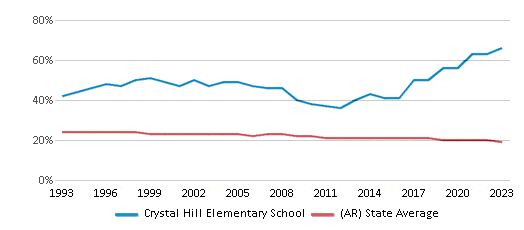
White
14%
58%
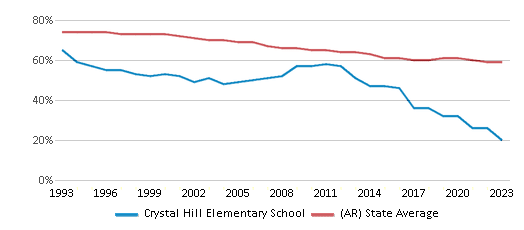
Hawaiian
n/a
1%
Two or more races
8%
5%
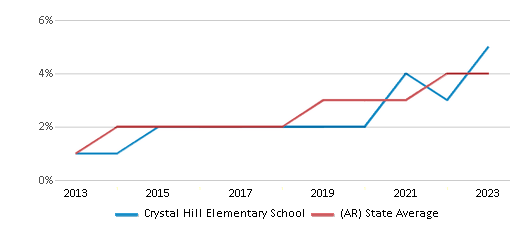
All Ethnic Groups
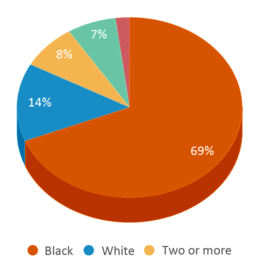
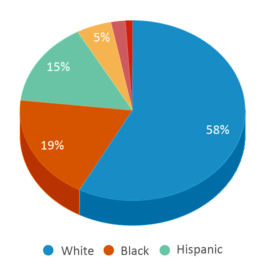
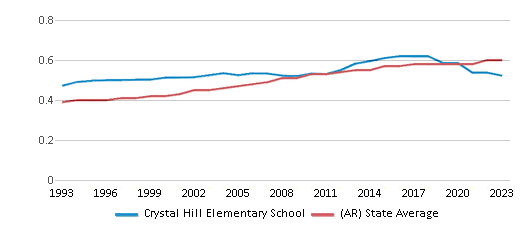
Participates in the National School Lunch Program (NSLP)
Yes
Eligible for Free Lunch
99%
56%
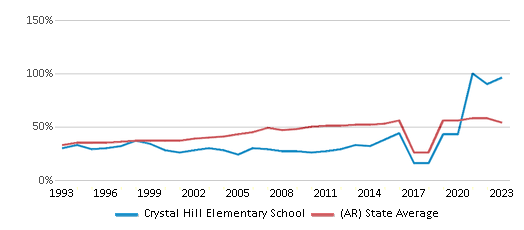
Eligible for Reduced Lunch (21-22)
7%
7%
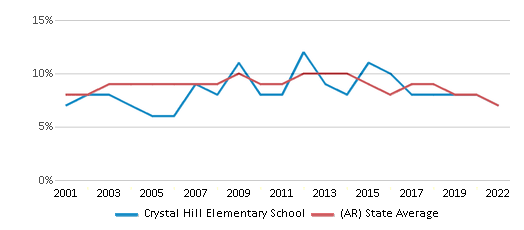
School Statewide Testing
School District Name
Source: National Center for Education Statistics (NCES), AR Dept. of Education
Profile last updated: 02/09/2025
Frequently Asked Questions
What is Crystal Hill Elementary School's ranking?
Crystal Hill Elementary School is ranked #765 out of 997 schools, which ranks it among the bottom 50% of public schools in Arkansas.
What schools are Crystal Hill Elementary School often compared to?
Crystal Hill Elementary Schoolis often viewed alongside schools like Pine Forest Elementary School, Maumelle Charter Elementary School, Gibbs Magnet Elementary School by visitors of our site.
What percent of students have achieved state testing proficiency in math and reading?
25% of students have achieved math proficiency (compared to the 38% AR state average), while 27% of students have achieved reading proficiency (compared to the 40% AR state average).
How many students attend Crystal Hill Elementary School?
470 students attend Crystal Hill Elementary School.
What is the racial composition of the student body?
69% of Crystal Hill Elementary School students are Black, 14% of students are White, 8% of students are Two or more races, 7% of students are Hispanic, and 2% of students are Asian.
What is the student:teacher ratio of Crystal Hill Elementary School?
Crystal Hill Elementary School has a student ration of 14:1, which is higher than the Arkansas state average of 13:1.
What grades does Crystal Hill Elementary School offer ?
Crystal Hill Elementary School offers enrollment in grades Prekindergarten-5
What school district is Crystal Hill Elementary School part of?
Crystal Hill Elementary School is part of Pulaski County Special School District.
School Reviews
1 3/27/2020
This school is not a good school for special needs families. They also don't do anything with bullying.
1 2/17/2020
This school is the worst school ever. There's a lot of bullying going on at that school.
5 4/7/2017
I have gone to this school since kindergarten and I love it! They have awesome and really great teachers. I would so recommend this school to others.
5 4/7/2017
My son is doing very well at Crystal Hill. He was a little shy when he came in to the school in kindergarten; however, he's now one of the top students in his class.
2 10/8/2015
I went to this school k-3 and they were never any help. We tried to work out a system that would help be successful, and they pushed me through school and now that I've moved schools and get the right help I've always needed I'm one on the top kids in all my classes.so no I would not recommend this school to any child in need of help...
Review Crystal Hill Elementary School. Reviews should be a few sentences in length. Please include any comments on:
- Quality of academic programs, teachers, and facilities
- Availability of music, art, sports and other extracurricular activities
Recent Articles

What Is A Charter School?
Explore the world of charter schools in this comprehensive guide. Learn about their history, how they operate, and the pros and cons of this educational innovation. Discover key facts about charter schools, including admission policies, demographics, and funding, as well as what to look for when considering a charter school for your child.

10 Reasons Why High School Sports Benefit Students
Discover the 10 compelling reasons why high school sports are beneficial for students. This comprehensive article explores how athletics enhance academic performance, foster personal growth, and develop crucial life skills. From improved fitness and time management to leadership development and community representation, learn why participating in high school sports can be a game-changer for students' overall success and well-being.

February 05, 2025
Understanding the U.S. Department of Education: Structure, Impact, and EvolutionWe explore how the Department of Education shapes American education, from its cabinet-level leadership to its impact on millions of students, written for general audiences seeking clarity on this vital institution.





